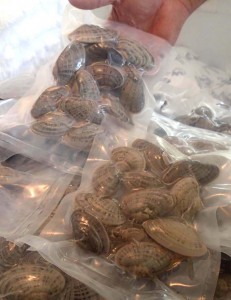Home » Sunray Venus Clams » Project VENUS » Project VENUS Objective 4
 To ensure consistent market supply without compromising product quality and demand, this project objective evaluates frozen sunray venus clams as a feasible complement to fresh product. The shelf life of cultured sunray venus clams has been documented seasonally to account for the influence of water temperatures at harvest. Like hard clams, survival of sunray venus clams in refrigerated storage is reduced during the summer. Having a frozen product inventory available during the summer or shellfish closures will provide an option for the seafood wholesale dealer and distribution sectors to deliver sunray venus clams to markets year-round.
To ensure consistent market supply without compromising product quality and demand, this project objective evaluates frozen sunray venus clams as a feasible complement to fresh product. The shelf life of cultured sunray venus clams has been documented seasonally to account for the influence of water temperatures at harvest. Like hard clams, survival of sunray venus clams in refrigerated storage is reduced during the summer. Having a frozen product inventory available during the summer or shellfish closures will provide an option for the seafood wholesale dealer and distribution sectors to deliver sunray venus clams to markets year-round.
Three shellfish wholesalers, who have the capability of freezing hard clams, agreed to participate by freezing sunray venus clams in their processing plants. Three protocols are being evaluated: 1) Vacuum packed (12 per unit), partially cooked, and quick frozen (IQF); 2) Vacuum packed (12 per unit), uncooked, and frozen; and, 3) Uncooked and frozen in bulk. Assessment of frozen product is being conducted at the UF Aquatic Foods Pilot Plant under the supervision of Dr. Charles Sims. At 1, 3.5 and 7 months, frozen product is assessed for taste and sensory characteristics and compared to fresh sunray venus clams. In addition, all four products are analyzed for microbial consequences. Measures are based on standard aerobic plate counts and fecal coliform counts utilizing FDA analytical procedures for seafood. These results will be made available to interested shellfish wholesalers.